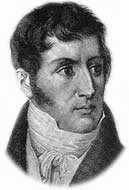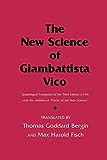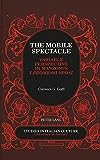18th century: enlightenment, rise of neoclassicism
a quick history of italian literature
By Roberto Simmarano

Cultural Revival in the 18th Century: Arcadia and Pietro Metastasio
Italian art experienced a revival in the 18th century,
particularly in the latter half with the spread of the
Enlightenment. The process was begun, however, in 1690 with
the founding of the Arcadia - a literary academy set up
with the aim of replacing the extravagance and artificiality
of the 17th century with a more serious and rational poetry
expressing true emotions. The major writer was Pietro
Metastasio (1698-1792), author of a number of melodramas in
which the main characteristic is a dream-like idyllism,
expressed in a highly musical language.
 Philosophical and Historical Research: Giovanni Battista Vico and Lodovico Antonio Muratori
Philosophical and Historical Research: Giovanni Battista Vico and Lodovico Antonio Muratori
The cultural revival of the early 18th century also caused
an increase of interest in philosophical and historical
research where the most important figure was Giovanni
Battista Vico (1668-1744). Vico rejected the prevalent
Cartesian rationalism and scientific interest in favour of
an investigation of mankind, the progress of human history
and psychological development. The historical studies of
Lodovico Antonio Muratori (1672-1750), with their critical
analysis of Italian civil and literary history, are also
worthy of note.
 The Spread of Enlightenment
The Spread of Enlightenment
Italian culture and literature experienced a revival in the
second half of the 18th century as a result of the spread of
the ideals of the Enlightenment. Italian writers felt the
need for contact with the rest of European culture and were
convinced that this was the only way Italy could play any
role in the progress of civilization. The Enlightenment to
them meant the search for a literature tied more closely to
contemporary issues and directed at a general social
improvement. The new ideas spread to Naples and especially
Milan where the periodical Caffè, the Verri brothers and
Cesare Beccaria (1738-1794) inquired into literary, economic
and civil problems with a modern approach.
Giuseppe Parini (1729-1799)
Giuseppe Parini best embodies the intellectual and spiritual
revival that took place in Italy in the second half of the
18th century. Parini is particularly notable for his moral
dignity and for his commitment to the spread of Enlightened,
progressive and humanitarian ideals through his public life
and writing. Parini's major work is Il Giorno, a satirical
poem in which he exposes the idleness, frivolities and
spiritual emptiness of contemporary nobility.
The Eearly 19th Century and
Neoclassicism
The Napoleonic period was characterized by the rise of
Neoclassicism, a cultural trend that spread widely from the
figurative arts to literature and the minor arts. The basic
tenet of Neoclassicism was that Classical art, with its calm
and balanced simplicity, expressed a perfect human and
spiritual harmony. Art should therefore be the expression of
an ideal and timeless beauty and a harmony of form, colour
and sound. The major Italian poet of the period was Vincenzo
Monti (1754-1828) whose elegant and passionate verse was
intended to escape the problems of the time, harking back to
the Classical and mythological world and its ever-present
ideal beauty.
Ugo Foscolo (1778-1827)
The works of Ugo Foscolo, one of Italy's major 19th-century
poets, fully express the poet's personal occupation with the
difficult years of mutation from the Enlightenment to
Romanticism, the French Revolution to the Restoration,
18th-century materialism to the Romantic religious angst.
They give voice to a lay earthly faith based on the highest
human values of truth, justice, beauty, patriotism and
liberty. These themes appear in his juvenilia Ultime
lettere di Jacopo Ortis, an autobiographical story in the
form of letters, two odes and Le Grazie (of clear
Neoclassic influence), but reach their fullest and most
poetic expression in the sonnet sequence and his most
successful poem, I Sepolcri.
 Giacomo Leopardi (1798-1837)
Giacomo Leopardi (1798-1837)
One of the great Italian poets of the 19th century was
Giacomo Leopardi for the depth of his thought, his acute
understanding of psychology and the power of his poetic
expression. Leopardi's characteristic existential anguish
reflects the general European spiritual and philosophical
crisis that marked the end of the Enlightenment and the rise
of Romanticism. The sceptical concepts of 18th-century
rationalism could not preclude Romantic angst about the
infinite, the eternal, a reason for life beyond ennui,
universal sorrow and inevitable death. Leopardi's lyrical
poems sing of illusion, love, beauty and the noble human
emotions as a comfort against the agonizing process of
living and an affirmation of Man's inherent dignity.
 Alessandro Manzoni (1785-1873)
Alessandro Manzoni (1785-1873)
Alessandro Manzoni's life and writings display a balance
between Enlightened ideals (justice, freedom and democracy),
Romanticism and Catholicism. Manzoni's inner strife led to
an abandonment of rationalist ideals in favour of
Catholicism but without renouncing Enlightened values.This
spiritual evolution can be seen in the Inni Sacri - five
poems which describe human affections within the scope of
the Catholic faith - the odes, the tragedies (Il Conte di
Carmagnola and Adelchi) and particularly in I Promessi
Sposi, a historical novel set in the 17th century. Manzoni
aims to present life with all its injustices and surprises,
where only the constant presence of God can bring relief and
meaning to human existence.
Our journey next month will take us in to the Risorgimento







